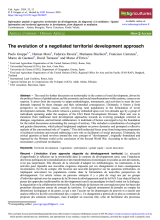Land Library Search
Through our robust search engine, you can search for any item of the over 73,000 highly curated resources in the Land Library.
If you would like to find an overview of what is possible, feel free to peruse the Search Guide.
/ library resources
Showing items 1 through 9 of 4705.Dans les zones rurales, où l’agriculture est la principale source de subsistance, la terre est bien plus qu’une simple ressource économique ; elle est essentielle à l’identité et à la culture des communautés.
This one-pager provides details on the LAND-at-scale project in Egypt. This project is implemented by GIZ Egypt, and financed by the Ministry of Foreign Affairs via the Netherlands Enterprise & Development Agency (RVO).
The need for further discussion on territoriality in the context of rural development, driven by the political forces of globalization and the economic and social transformations within nations, comes as no surprise.
This study addresses the significant issue of land fragmentation in Ethiopia, which is characterized by small, irregular, scattered parcels with no or adequate road access.
This document includes recommendations to different stakeholder groups (from governments to UN organizations) to operationalize a human rights-based approach to climate justice that affirms the link between climate action and land tenure security of the rural poor.
The Global Programme 'Responsible Land Policy' (GPRLP) is part of the Special Initiative 'One World, No Hunger' of the German Federal Ministry for Economic Cooperation and Development (BMZ), which aims to reduce extreme poverty and hunger.
The Voluntary Guidelines on the Responsible Governance of Tenure of Land, Fisheries and Forests in the Context of National Food Security (VGGT) and the Framework and Guidelines on Land Policy in Africa (F&G) are important international and continental instruments for improving the governance
La Revue annuelle de l’efficacité du développement (ADER) sert de point de référence pour évaluer les progrès réalisés par le Groupe de la Banque africaine de développement dans sa contribution au développement de l’Afrique.
Socle de l’Algérie française, l’appropriation coloniale des terres commence peu avant 1840, dans le sillage des troupes d’occupation. Elle prend son plein essor entre 1871 et 1914, une fois la conquête achevée [Cartes et graphique].








